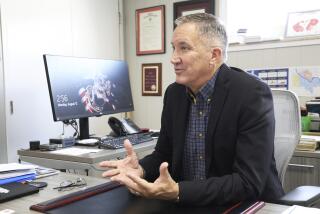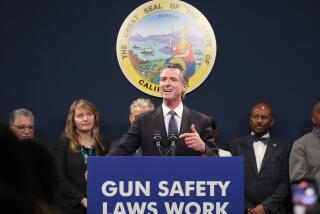OKLAHOMA CITY: AFTER THE BOMB : Governor Still Backs Concealed Gun Law : Arms: Oklahoma lawmakers are expected to pass the measure despite the bombing. Keating says McVeigh’s arrest and fears of extremism are relevant.
- Share via
OKLAHOMA CITY — Almost daily since the terrorist car-bomb attack on April 19, Oklahoma Gov. Frank Keating has visited the ruins of the Alfred P. Murrah Federal Building to speak poignantly about the terrible blow that his state has suffered at the hands of right-wing fanatics.
Then he returns to the state Capitol uptown, where his staff and legislative allies are finalizing a proposed law to let Oklahomans carry concealed firearms--just as accused bomber Timothy J. McVeigh was doing when he was arrested shortly after the devastating blast.
Clearly, the imminent passage of a concealed weapon law here runs counter to the perception in Washington and elsewhere around the nation that the Oklahoma City bombing could sap the gun lobby’s drive to broaden access to firearms.
“The gun lobby has (Oklahoma’s state legislators) in their grip,” observed Joe Sudbay, director of state legislation for Handgun Control Inc., a Washington-based gun control lobby.
Even though the worst terrorist attack in U.S. history has put Keating and his allies on the defensive, they firmly insist that it is not incongruous for them to enact a law so ardently championed by extremist militia groups, among others, while at the same time decrying the growing violence in America, which Oklahomans now know all too well.
In fact, 21 states now allow citizens to carry concealed weapons, and another 18 are moving forward on such legislation. And so far, the bombing seems to have done nothing to slow this trend.
“The (bombing) in Oklahoma City doesn’t seem to have had a lot of impact on anything,” said Bruce Elfant, a county constable and spokesman for Texans Against Gun Violence, a group of law enforcement officers opposed to concealed weapons.
But the tragedy has intensified the debate over gun control. Gun-control advocates insist that the bombing-inspired public revulsion should be linked to their position; their opponents insist there is no relationship between the two.
While Sudbay said that gun-control advocates are not trying to capitalize on the Oklahoma City tragedy, they are quick to argue that it does not make sense to broaden access to guns. For this reason, Republicans in Congress who oppose gun control have decided to delay a vote to repeal the nationwide ban on some assault weapons.
The Oklahoma City bombing, Sudbay said, “has shown the extreme positions of the gun lobby.”
“The same kind of rhetoric you hear from the militia groups is the kind of stuff you hear from the gun lobby,” he said. “They all say it’s safer if everyone has a gun. We think it’s clear that Americans are now able to decide whether these are the kind of people they want carrying around concealed weapons.”
But Wayne LaPierre, executive vice president of the National Rifle Assn., insisted that “the gun issue has absolutely nothing to do with the bombing in Oklahoma City.”
Nonetheless, LaPierre said Saturday on CNN’s “Inside Politics” that the NRA agrees with the decision by House Speaker Newt Gingrich (R-Ga.) and Senate Majority Leader Bob Dole (R-Kan.) to delay a vote to repeal the assault weapon ban. President Clinton has said he would veto such a repeal.
Whatever the outcome of the move to repeal the ban, observers in Oklahoma said there is little doubt that the state’s concealed-weapon legislation will become law--and a highly popular one at that--within weeks in this strongly pro-gun state.
“It was not terribly controversial. The debate was not especially impassioned. And the vote was not even close,” Danney Goble, a historian and political analyst at the University of Oklahoma, said of the impending action by the state government.
Both the state Senate and House have passed different versions of the bill. House approval came just one week before the car bombing. As of now, the bills’ differences are being reconciled. And Keating, a Republican, has vowed to sign the measure.
The proposed law’s popularity is not surprising, said Goble.
After all, he noted in an interview, Oklahoma’s freshman senator, James M. Inhofe, a Republican, was overwhelmingly elected last November largely on the strength of three simple campaign issues, dubbed the “three G’s”: God, guns and gays.
To qualify for a four-year license to carry a concealed weapon under the proposed state law, one must be a resident and at least 21 years old, with no felony or drug convictions. A license applicant also must complete a handgun safety course and pass “a rigorous” background check by both the federal and the state bureaus of investigation, according to state Sen. Frank Shurden (D-Henryetta), the bill’s author.
“The only people who would be put in danger by this law would be the criminals,” Shurden said late last week.
According to Shurden, who named his bill the Oklahoma Self-Defense Act, the bombing only underscored the need for such legislation because it all too graphically “re-emphasized the helplessness of the innocent.”
And, Shurden insisted, it is “just not true” that extremist militia groups have championed his bill.
“Actually, the members of these far-right-wing groups are some of the strongest opponents of the bill,” he said. “They feel it has too many restrictions.”
Among other things, the law bars licensees from carrying concealed weapons into federal buildings, police stations, schools, courthouses and many other public places.
Shurden also disputed assertions by some that McVeigh might not have been taken into custody if the bill had been in effect.
Barely an hour after the bomb blast, Oklahoma Highway Patrolman Charlie Hanger pulled McVeigh over for driving a car with no license plate. The officer might well have issued McVeigh a traffic citation and then let him go. But because McVeigh was carrying a concealed weapon, he was taken into custody.
Since McVeigh is not an Oklahoma citizen, Shurden noted, he would not have been eligible for a license to carry a concealed gun under the proposed legislation.
Keating agreed, telling reporters: “McVeigh would never have applied for a concealed weapon and would never have been entitled to one if he had applied.”
Three states this year have adopted laws allowing citizens to carry concealed firearms: Virginia, Utah and Arkansas. Kansas and New Mexico already have rejected such legislation, while in Illinois and Wisconsin, the drive faces opposition from the governors.
One of the hottest battlegrounds is Missouri, where gun-control groups--led by state law enforcement agencies, including the Missouri Police Chiefs Assn.--have turned back legislation in each of the last four sessions of the state Legislature. In fact, their repeated success has emboldened the police chiefs’ group to seek a statewide public referendum on the issue.
“We’re convinced that the public would reject concealed weapons legislation if they had a chance to vote on it,” said Tim Jackson, executive director of the Missouri Police Chiefs Assn.
At the same time, he admitted, he sees a referendum primarily as a defensive move against the growing political clout of the gun lobby. Without an expression of public support, he said, he worries that state lawmakers may yet be forced to cave in to “the large and loud voices of the pro-gun forces.”
“We know that it’s not an issue that’s going to go away. The only way to make it disappear is to have a referendum and let the public say clearly they don’t want people carrying concealed weapons.”
Chen reported from Oklahoma City and Fulwood from Washington.
More to Read
Sign up for Essential California
The most important California stories and recommendations in your inbox every morning.
You may occasionally receive promotional content from the Los Angeles Times.










